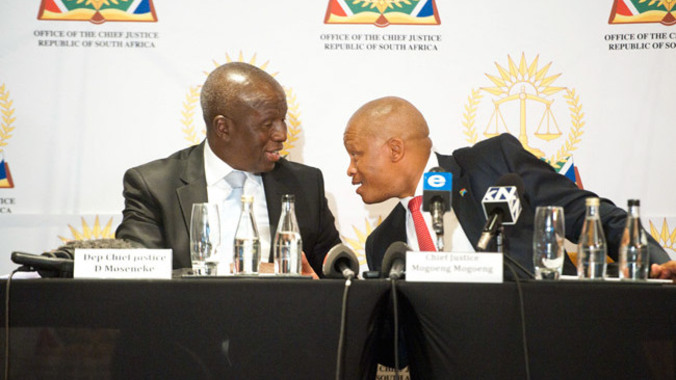Senior judges yesterday called for a meeting with President Jacob Zuma to discuss the “general gratuitous criticism” of the judiciary by cabinet ministers and other politicians.Chief Justice Mogoeng Mogoeng, on behalf of the judges, said that although judges, like everyone else, should be susceptible to constructive criticism, that criticism should be “specific and clear”.
He said the rule of law is the cornerstone of South Africa’s constitutional democracy and everyone is bound by the constitution and the law.
“As a nation we ignore it at our peril,” he said.
But he said that a crisis point had not been reached.
“It is, at most, a moment of deep reflection and a moment of brutal institutional introspection.”
The heads of courts – among others, the judge presidents of all the divisions of the High Court and the president of the Supreme Court of Appeal – issued their statement yesterday after an extraordinary meeting at which they discussed what they referred to as the “relations” between the three branches of the state: the executive, the legislature and the judiciary.
The meeting followed recent criticism of the judiciary by ANC secretary-general Gwede Mantashe and SA Communist Party general secretary Blade Nzimande.
Police Minister Nathi Nhleko joined the chorus by saying “some elements of the judiciary meet with characters to produce certain judgments”.
The government recently disregarded a High Court order that Sudanese President Omar al-Bashir be prevented from leaving South Africa after an African Union conference in Johannesburg.
Mantashe said some judges were against the state. He said there were concerns that judgments of certain High Court divisions consistently went against the state.
Nzimande said the courts had to respect parliament and the executive.
“If we don’t debate this we run the risk of parliament matters and executive matters being run by the courts,” Nzimande said.
Mantashe yesterday welcomed the decision by the judges to call for a meeting with Zuma.
“It is a positive development because we are raising issues that we feel are of a serious nature. We will welcome that meeting, in fact, we will welcome a broader meeting, including a delegation of judges.”
Mantashe said the ANC would not be satisfied with a mere assurance that its concerns would receive the attention of judges by virtue of them having asked for a meeting with Zuma. He said the ruling party wanted the judiciary to deal with the issues raised.
“If you look at the abridged media statement [issued by the judges], it does not reflect the issues that we raised,” he said.
Nzimande said there must be no judicial “over-reach” into political issues that could be resolved only by the political branches of the state.
SACP spokesman Alex Mashilo said important issues such as jurisprudence and its foundations, as well as access to justice, cannot be avoided in the transformation process. He said transformation of the judiciary would be up for discussion at the party’s special congress, which ends on Saturday.
Mogoeng said criticism of the judiciary had the potential to delegitimise the courts.
“Courts serve a public purpose and should not be undermined,” the judges said.
He said the heads of court felt that Zuma was the person to talk to regarding the criticism.
“The president is also the president of the ANC. The ANC is a critical component of the tripartite alliance.
“To the extent that some statements were attributed to role- players in the alliance, Zuma is best placed to discuss these concerns,” Mogoeng said.
Mogoeng said the constitution set out the powers of each arm of state and no arm was entitled to intrude on the domain of another.
“However, the constitution requires the judiciary ultimately to determine the limits and regulate the exercise of public power,” Mogoeng said.
He said judges should be susceptible to constructive criticism but that the criticism should be fair and in good faith.
“General gratuitous criticism is unacceptable,” Mogoeng said.
He said court orders should be obeyed and the judiciary’s experience was that they had largely been honoured by other arms of state.
But he warned that when court orders were not complied with, for whatever reason, the rule of law was undermined.
The Centre for Constitutional Rights said “politics are not above or detached from the constitution, but subject to it”. Times Live






 WhatsApp us
WhatsApp us 

